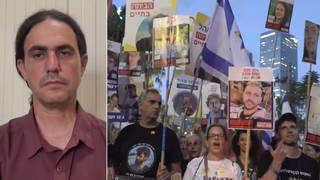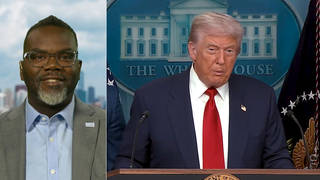
Topics
As the tense standoff between the United States and radical Shiite cleric Muqtada Al-Sadr continues in Iraq we go to Najaf and Hilla to get a report from Aaron Glantz of Free Speech Radio News on the killing of two Sheikhs by U.S. soldiers in Hilla. [includes rush transcript]
The tense standoff between the United States and radical Shiite cleric Muqtada Al-Sadr continued this week in Iraq.
In the holy city of Karbala, militiamen of the Mahdi army loyal to Sadr fired mortar bombs, rocket-propelled grenades and machineguns at U.S. and Bulgarian positions. Hospital sources said three gunmen were killed and nine wounded.
This followed similar clashes in Najaf earlier this week in which at least five militiamen were killed.
The gun battle in Karbala came hours after rival Shiite political leaders called on Sadr to disarm in favor of a political solution.
U.S. forces have vowed to capture or kill Sadr, whose Mahdi army controls Najaf, nearby Kufa and Karbala and maintains a presence in many other cities, including Baghdad.
In Najaf, two top ShIite clerics were assassinated this week, Aaron Glanzt of Free Speech Radio News reports from Najaf and Hilla.
Transcript
AMY GOODMAN: This is Democracy Now! As we turn now to Iraq, where the fighting and standoff between U.S. soldiers and insurgents continue, we go to Aaron Glantz, at Free Speech Radio News in Najaf.
AARON GLANTZ: Dozens of followers of Muqtada al-Sadr sing songs of martyrdom as they carry the coffins of their two slain comrades into the shrine of the revered Imam Ali in the Iraqi holy city of Najaf. Every night, Sadr’s fighters engage in pitched battle with the U.S. military which has placed its tanks just outside of the city limits. But that’s not where these men died. These two coffins bear the bodies of senior sheiks, one a descendant of the prophet Mohammad, and the way they were killed can tell you a lot about the patterns and practice of the American occupation. The afternoon call to prayer sounds outside the Babylon Human Rights Organization in Hillah, a small town on the Tigris River, an hour’s drive south of Baghdad. It was here that American soldiers raided a community meeting where they killed two sheiks and arrested two other important community leaders. Said Fada’ al-Musawi explains:
SAID FADA’ AL-MUSAWI: All types of power were represented, political parties and scientists and religious men. They were trying to figure out what was happening around us. They were discussing everything that was happening in Hillah. They were studying what was happening in our country.
AARON GLANTZ: The main goal of the meeting, according to representatives of the human rights organization, was how to confront the American occupation without resorting to violence. It was a regular topic of discussion at this organization, which was well known to American officials. A few months before, hawkish Deputy Defense Secretary Paul Wolfowitz had visited the organization to praise its efforts. But there seems to be a different relationship now. The group’s Hashim al-Safi was proud to have a photograph showing him and Wolfowitz shaking hands, but he has a different feeling today.
HASHIM AL-SAFI: We were peaceful. We just had pens and paper, but they came with a whole bunch of arms.
AARON GLANTZ: Hashim says fifteen American soldiers ordered everyone down on the ground and ran to the podium to arrest the speaker, Said Adnan Nonabi, head of Muqtada al-Sadr’s office in Hillah. They placed a black hood over his head and then, Hashim says, the American soldiers turned their attention to the two sheiks in a nearby hallway.
HASHIM AL-SAFI: They shot them where they were standing, and you can see the blood on the doors. They shot them from just one or two meters away.
AARON GLANTZ: The bullets that killed the two sheiks were the only shots fired in the human rights office. The only bullet holes in the hall are amidst a blood-spattered wall where the two sheiks were shot. Fragments of the two sheiks’ brains can still be seen on the floor, corroborating claims they were shot in the head. Meantime the head of the local office of Muqtada al-Sadr, Adnan Nonabi, has disappeared into U.S. custody. Troops at the local military base, which is maintained by Poland, told Democracy Now! they didn’t know anything about the raid. The headquarters of the Coalition Provisional Authority in Baghdad explained it will take them ten days to tell us where he’s been taken. Adnan’s sister-in-law Um Ali says prison is nothing new for her Adnan Nonabi, who was jailed for a year by Saddam Hussein for giving a critical sermon in Friday prayers.
UM ALI: Adnan was hoping Americans would liberate us from Saddam and was happy at the time because he was tortured so much by the regime. He was put in prison by Saddam because he was against the government. [gunshots]
AARON GLANTZ: The arrests and killing of Sadr’s leaders in Hillah comes at a time of fighting in Najaf, the holiest city in Shi’a Islam. Every night, members of Muqtada al-Sadr’s Medi Army clash with U.S. troops just a few miles away from the shrine of Revered Imam Ali. Last night, twenty members of the Medi Army died in clashes. They likely won’t be the last. Ad Nazzour left his house in Mosul to fight the Americans in Najaf. He also left behind his wife and his 6-month-old baby. AD NAZZOUR: We believe in God. God creates us and God takes us back. So if we are protecting our religion, we’ll be taken to the sacred place, so we can do anything. I will follow my orders, whether it’s bombing or killing, anything.
AARON GLANTZ: At the same time it seems both sides continue to look for a way out of the current standoff. Aqil Abdul Bunof Zouain has been negotiating with the American military commanders on behalf of Muqtada al-Sadr.
ZOUAIN: There is a negotiation begun here, between American soldiers and Mr. Muqtada al-Sadr. The chief of tribes is lead of these negotiations between two sides. One condition of Muqtada al-Sadr, he said that the Americans should be removed or should be moves from Najaf because it contains the holy shrine of Imam Ali.
AARON GLANTZ: In addition to a complete American withdrawal from Najaf and Kufa, Sadr’s supporters demanded their leaders not be arrested or killed by occupation troops. They further demanded his fate be given over to a legitimate Iraqi government. In exchange, Muqtada al-Sadr is willing to agree to stop killing foreign troops on Iraqi soil. It’s now up to the Bush Administration to accept or reject the offer. For Democracy Now!, I’m Aaron Glantz in Najaf and Hillah, Iraq.
AMY GOODMAN: This is Democracy Now! When we come back, top secret government experiments on unexpecting Americans over decades. We’ll be joined by a Pulitzer Prize winning reporter who unearthed it all. Stay with us.












Media Options